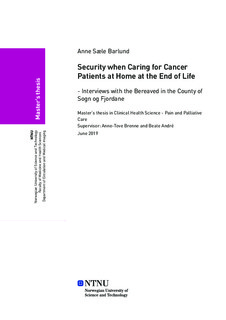| dc.contributor.advisor | Brenne, Anne-Tove | |
| dc.contributor.advisor | André, Beate | |
| dc.contributor.author | Barlund, Anne Sæle | |
| dc.date.accessioned | 2019-09-22T14:00:46Z | |
| dc.date.available | 2019-09-22T14:00:46Z | |
| dc.date.issued | 2019 | |
| dc.identifier.uri | http://hdl.handle.net/11250/2618118 | |
| dc.description.abstract | Abstrakt
Bakgrunn: Dei siste tiåra har det blitt mest vanleg å døy i sjukehus eller på sjukeheim i Noreg. Kreftpasientar ønskjer likevel å vere lenger heime og kanskje døy heime. Likevel er Noreg på botnen av lista over heimedød i Europa. Ein viktig faktor som avgjer pasientanes og familiens val og ønskje om å bli pleia heime og døy heime, er kjensla av tryggleik. Pårørande spelar ei avgjerande rolle i tilrettelegginga for at den palliative kreftpasienten kan vere heime og kan døy heime. Det er viktig at dei kjenner seg trygge i si oppgåve for å kunne gjennomføre pleie- og omsorgsoppgåva heime. Formål: Målet med studien var å undersøkje kva faktorar som avgjorde tryggleika til pårørande som pleia den døyande kreftpasienten heime, i Sogn og Fjordane. Materialar og metodar: Det blei utført ein kvalitativ studie med semi-strukturerte djupneintervju av etterlatne med erfaring frå omsorg og pleie for ein kreftpasient heime ved slutten av livet. Resultat: Tre hovudkategoriar resulterte frå analysen; «Personlege faktorar», «Helsepersonell» og «Organisering» av helsetenestene. Konklusjon: Fleire personlege faktorar bidrog til kjensla av tryggleik blant pårørande. Helsepersonell og organisering av helsetenestene bidrog likevel mest til kjensla av tryggleik. Dette understrekar behovet for å sikre god kompetanse innan palliativ omsorg blant helsepersonell og velorganiserte palliative omsorgstenester med meir definert ansvar for å kunne gje tryggleik til pårørande som pleier den døyande kreftpasienten heime i Sogn og Fjordane. | |
| dc.description.abstract | Abstract
Background: In the last decades it has been most common to die in hospitals or in nursing homes in Norway. However, cancer patients wish to stay longer at home and maybe die at home. Still, Norway is on the bottom of the list of home deaths in Europe. An important factor that determines the patient’s and family’s choice and wishes to stay at home and die at home is the feeling of security and safety when caring for the patient at home. Carers play a crucial role in the facilitation of time at home and home death, and it is important that they feel secure in their task to be able to carry out home care. Purpose: The overall aim of this study was to explore factors that determined the security of family carers of patients with advanced cancer who cared for the patients at home in Sogn og Fjordane. Material and methods: A qualitative study using semi-structured in-depth interviews with bereaved with experience from caring for cancer patients at home at the end of life was performed. Results: Three main categories emerged from the analysis; “Personal factors”, “Healthcare professionals” and “Organization” of healthcare. Conclusion: Several personal factors contributed to the feeling of security among carers of cancer patients caring for the patient at home at the end of life. However, healthcare professionals and the organization of healthcare service contributed most to the feeling of security. This suggests the need to ensure good competence in palliative care among healthcare professionals caring for patients with advanced cancer at home and well- organized palliative care services with defined responsibilities to provide security to carers caring for advanced cancer patients at home at the end of life in the county of Sogn og Fjordane. | |
| dc.language | eng | |
| dc.publisher | NTNU | |
| dc.title | Security when caring for cancer patients at home at the end of life- interviews with bereaved in the county of Sogn og Fjordane. | |
| dc.type | Master thesis | |
